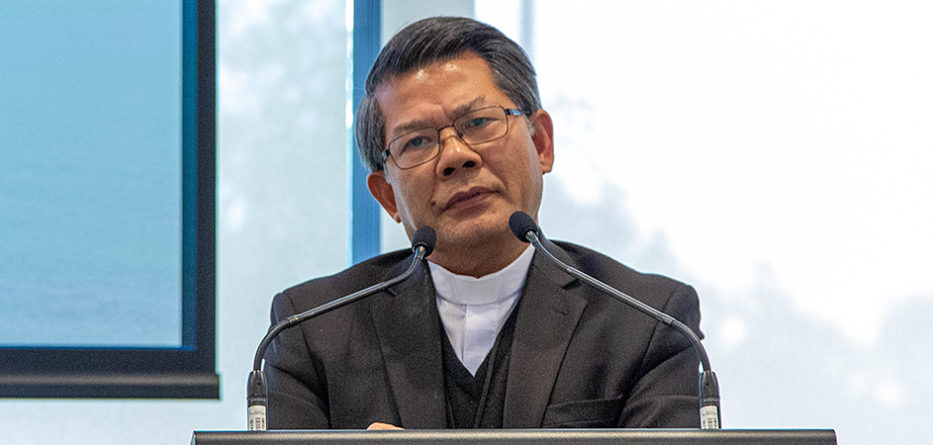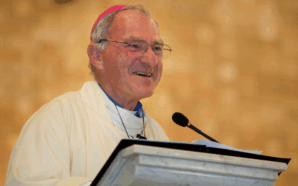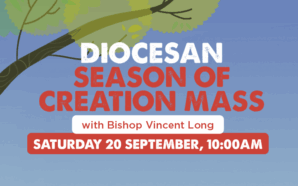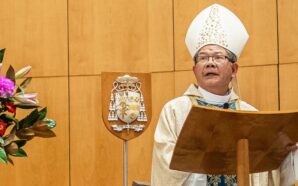Most Reverend Vincent Long Van Nguyen OFM Conv DD STL, Bishop of Parramatta
Address to the St Vincent de Paul Society’s (SVDP) Virtual Retreat
“Reflection on being the Church of the Poor”
17 November 2021
I would like to pay my respects and acknowledge the traditional custodians of the land on which we gather respectively. Here in Harris Park, it is the land of the Darug people. I acknowledge their physical and spiritual connections to their land, their stories, traditions and living cultures. I also pay respects to their Elders past, present and emerging.
Pope Francis’ vision of the Poor Church
Thank you for the invitation to speak at this forum. You Vinnies are the living embodiment of the Church of the poor that Pope Francis envisions. In fact, ever since his surprise election eight years ago, he has been leading us towards the periphery. We have a sense that the Pope is unambiguous about the direction the Church should take. He is decisive in implementing the ecclesial vision of the Second Vatican Council. I’d like to describe this in terms of a movement from clericalism to service, from self-reference to openness, from splendour to simplicity, from triumphalism to humility, from a siege mentality to engagement, from safeguarding our privileges to learning to be vulnerable in order to convey God’s compassion to those who are on the edges of society and the Church.
It is those precarious liminal spaces where the true cost of our discipleship is counted, because we dare to walk with the Samaritans of our time, just like Jesus did before us. The crisis of diminishment that we face (numbers, influence, wealth, most of all, credibility) allows us an opportunity to divest ourselves of all the unnecessary trappings, to focus on what is our core mission, to act more prophetically and to live more fully, more creatively, more boldly, more at the periphery.
The World Day of the Poor that the Pope himself initiated four years ago has been part of his strategy to realise this vision. It is a day when the whole Church is reminded in a visible way of our commitment to be with the poor and to make them the centre of our pastoral endeavour.
Pope Francis went to Assisi, the city of his namesake, to celebrate this occasion with 5,000 people including the local homeless and Afghan refugees. The theme for this year’s World Day of the Poor is “for the poor you have always with you” from the words of Jesus at the Anointing in Bethany just before his Passion. Sometimes this sentence is taken to mean that the poor will be around in every time and every place, and therefore we should not worry too much about eradicating poverty or alleviating the poor.
Nothing can be further from the truth. The Pope says that Jesus was actually reminding the disciples that he is the first of the poor, the poorest of the poor, because he represents all of them. It was also for the sake of the poor, the lonely, the marginalised and the victims of discrimination, that Jesus accepted the woman’s gesture. Therefore, far from dispensing his disciples from their duty of care to the poor, he identified himself with them in every place and every generation. It is in serving them and their cause that we become his true disciples.
“The poor you have always with you”, should not make us indifferent, but summons us instead to a mutual sharing of life. The poor are not people “outside” our communities, but brothers and sisters whose sufferings we should share, in an effort to alleviate their difficulties and marginalisation, restore their lost dignity and ensure their necessary social inclusion.
More than just charity
The Pope goes on to say that the encounter with the poor is more than just charity, or acts of benevolence, important as they are. Our encounter with the poor should be a genuine sharing, an establishment of community, a desire to get to know those who may have been invisible to us.
Aware of the many unjust situations around the world, the Pope calls the Church to be a place of respite, healing and hope. It is our calling to be a counter-witness to self-centred and fear-induced behaviour. He writes: “The silent cry of so many poor men, women and children should find the people of God at the forefront, always and everywhere, in efforts to give them a voice, to protect and support them in the face of hypocrisy and so many unfulfilled promises, and to invite them to share in the life of the community”.
Thus, sharing God’s blessings for us with the poor is at the heart of Catholic identity. St Francis of Assisi used to say that the poor are not simply entitled to our surplus. Rather as children of the same Creator God, they are entitled to the goods which are entrusted to us as a matter of their equal birthright. Hence, true love of the poor is not simply a matter of acting with mercy and compassion to those in need with our wealth, power and privilege intact. Rather, it is rooted in our radical equality, common humanity and shared inheritance. It finds expression in solidarity, communion and justice.
In our society, we also have people who experience the poverty of isolation and loneliness, homelessness, modern-day slavery, trafficking, relational poverty, the experience of being abused or the victim of violence. These circumstances are often drivers of material poverty, or the result of material poverty. The Gospel calls us to a conversion of heart and this conversion is primarily a conversion to a new consciousness and way of living. It moves us from a place of self-concern and apathy to connection, shared humanity and solidarity with all.
Modelling on the early Church
COVID has taught us “no one is saved alone”, the Pope writes elsewhere. That knowledge demands a new politics of inclusion and communion. It equips us to avoid both excessive individualism and the aggressive populism that thrives on identifying enemies at home and abroad. “Fraternity,” the Pope insists, “is the new frontier”, capable of knitting together the competing demands of liberty and equality.
The fraternity that we are called to live and to signal to the world of the new social ordering is not merely a rejection of individualism. It is about a way of life that is based on reciprocal and interconnected relationships. It is inherent in the indigenous wisdom which acknowledges the radical independence and reciprocity within diverse webs of life. Thus fraternity is a mindset and practice of community and a circular, harmonious relationship with all life and nature. It contrasts with the Western paradigm of domination of top-down linear thinking, separation of nature and humanity, competition, and divisions.
Our society has been shaken by a global pandemic. The poverty which existed in our communities has been exposed and the hardest hit are those who were in poverty before the pandemic. Other types of poverty are on the increase, such as mental ill-health, domestic violence, food poverty.
From its entry onto the world stage in Jerusalem 2,000 years ago, the Christian community was known for its service to the poor. In fact, the early Christians saw themselves as being fundamentally rooted in Christ and the Gospel ethos in regard to how they lived, how they related to each other and shared resources and how their way of life displayed the characteristics of an alternative society.
Central to these characteristics are concern and care for the weak, the lowly and the vulnerable. We are told that this early Church was poor, few in numbers, marginalised by the dominant society and persecuted by the authorities. Yet it was a powerhouse of prayer, love and solidarity. They showed to the world that it was possible to imagine a world outside the totalising and destructive power of the empire, and instead to live with an alternative system of fraternal concern, compassion and communion.
Today, we are challenged to reclaim the vision of a poor servant Church that shone like a light in the darkness of the world. We must model on the Church that shone forth its best rays of hope when it was poor, persecuted and powerless.
Re-imagining Vincentian charism
St Vincent de Paul indeed is essentially a lay-inspired and lay-led Catholic organisation. Blessed Frederick Ozanam was prophetic in so many ways and his vision of the church making a difference to the world by active engagement on the part of committed men and women disciples was one of them. Without naming the church as the People of God, Frederick championed the fundamental notion of the baptismal identity and mission of each and every Christian. St Vincent de Paul was conceived not simply as an accessory of the institutional church. Rather, it was a concrete expression of the witness of solidarity on the part of the baptised. Its works of charity were motivated by God’s love and mercy for all.
I happen to think that many lay groups like St Vincent de Paul are carrying the baton that has been passed to them by their spiritual forebears. Against the tendency to domesticate the radical Gospel spirit on the part of the mainstream, these women and men disciples hold the rest to the dream. They keep the flame of the Gospel burning bright. In this sense, they are doing the greatest service to the Church by their radical witness at the margins. It is for the sake of the Church and for the sake of the Kingdom that they are called to raise their prophetic voice; they speak for the voiceless, amplify the voice of the poor and marginalised, and make them count.
The ministry of Jesus, as portrayed in the Gospels, was not just a matter of doing good deeds. It was ever an expression of the divine pathos for marginalised and afflicted humankind. In their encounter with Jesus, people experienced not simply a humanitarian gesture but also a glimpse of God’s unconditional love. Pope Francis recently spoke about the temptation of the church to become a compassionate non-governmental organisation. This happens when despite doing work in the name of the church or in the name of God, we fail to convey the love and presence of God.
St Vincent de Paul is not a secular organisation. Even in the climate of mistrust, it must not divorce itself from its spiritual origin and heritage. Ultimately, it is concerned with the kingdom vision of Jesus. It seeks to develop a community of hospitality, fraternity and justice, which is an alternative model to the economy of extraction and predation. As members of St Vincent de Paul, we endeavour to follow the compassionate Jesus and be the sacrament of God’s compassion and care for the least and the last. The Church is first and foremost an oasis of hope and Good News. The church can only be the conduit of compassion and speak the language of hope to a broken humanity when it truly personifies powerlessness and stands where Christ once stood, that is, firmly on the side of the outcast and the most vulnerable. We must therefore learn to be a soothing presence, a warmth of God’s care and a gentle reach of God’s hand, affirming, healing and uplifting.
Conclusion
Guided by the kingdom vision of Jesus and open to a world of change, the Church can live up to its prophetic call to be a beacon hope for humanity. We can be an alternative relational paradigm for those on the margins, where the poor and the forgotten can be brought into a new unity; a Church that advocates life at all costs and promotes peaceful life in a war-torn and violent world; a Church that models justice in an age of greed, consumerism, and power; a Church centred on the risen Christ, empowering a consciousness of the whole.
St Vincent de Paul is uniquely placed to facilitate the rebirth and transformation of the Church. Drawing on the example and legacy of Frederick, we too can shine the light of the Gospel to the social challenges in today’s world. We too can hold the church to account on the litmus test of its mission, which is the care of the least of our brothers and sisters. Then we can rise to being the church that Christ calls us to be, moving forward: an oasis for the weary and troubled, a field hospital for the wounded, a refuge for the oppressed and a voice for the voiceless.
I’d like to conclude with the appeal of Pope Francis: “The poor are present in our midst. How evangelical it would be if we could say with all truth: we too are poor, because only in this way will we truly be able to recognise them, to make them part of our lives and an instrument of our salvation.”
Most Rev Vincent Long Van Nguyen OFM Conv
Bishop of Parramatta








